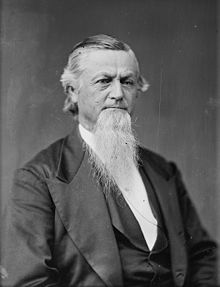George Gibbs Dibrell
George Gibbs Dibrell (* 12. April 1822 in Sparta , White County , Tennessee ; † 9. May 1888 ) was an American lawyer, Brigadier General of Confederate in the Civil War and a member of the House of Representatives of the United States , and President of the South Western Railroad .
Life
Dibrell attended a public school and then studied law at East Tennessee University in Knoxville , Tennessee. He completed his studies in 1843, was admitted to the bar and opened a law firm that same year. At the same time he worked successfully as a farmer and businessman and was involved in politics. As early as 1840 Dibrell was selected to head the Sparta Bank of Tennessee branch and held that post for six years until his marriage to Mary E. Leftwick. He was elected Justice of the Peace of White County four times through 1860. Dibrell was elected to the Tennessee House of Representatives in 1861 .
Civil War
Dibrell volunteered for a Tennessee State Militia Regiment when the war broke out . In the 25th Tennessee Infantry Regiment he initially served as a soldier and was later elected deputy commander and promoted to lieutenant colonel on August 10, 1861 . With the regiment he took part in the Battle of Mill Springs and the Siege of Corinth . Then Dibrell set up the Partisan Rangers in White County , officially called the 8th Tennessee Cavalry Regiment, and in September 1862 became its commander.
Dibrell led in the further course of the Civil War from September 1863 to April 26, 1865 as a commander of various cavalry brigades, mostly in the western theater of war under the command of the Tennessee Army , from November 1864 to March 1865 also on the east coast. Dibrell also commanded a cavalry division from February to April 1864. He was wounded twice and promoted to Brigadier General on July 26, 1864, effective January 28, 1865 . In April 1865 he assisted in the evacuation of Richmond , Virginia , the security of the Confederate National Archives and escorted the President of the Confederate , Jefferson Davis , in his escape from Greensboro , North Carolina to Georgia . On May 9, 1865, Dibrell was released on parole near Washington , Georgia.
Late years
Dibrell returned to his farm after the war and worked as a merchant and lawyer. He was elected President of the Southwestern Railroad in 1869 and in 1870 a member of the Constituent Assembly ("Constitutional Convention") of Tennessee. Dibrell was a member of the Democratic Party and was elected to the 44th United States Congress in 1875 . After being re-elected four times, he left the House of Representatives on March 3, 1885. After his death, he was buried in the Old City Cemetery in Sparta.
Individual evidence
- ↑ DIBRELL, GG White County TNGenWeb, January 18, 2018, accessed February 25, 2018 (biography).
- ^ A b c John H. and David J. Eicher: Civil War High Commands. Stanford University Press, 2001, accessed on February 25, 2018 (Dibrell's life data, p. 209).
See also
literature
- David J. Eicher: The Civil War in Books: An Analytical Bibliography , University of Illinois, 1997, ISBN 0-252-02273-4 .
- Richard N. Current: Encyclopedia of the Confederacy (1993) (4 vol.) ( ISBN 0132759918 )
- John H. Eicher & David J. Eicher: Civil War High Commands , Stanford University Press, 2001, ISBN 0-8047-3641-3 .
- Ezra J. Warner: Generals in Gray: Lives of the Confederate Commanders , Louisiana State University Press, 1959, ISBN 0-8071-0823-5 .
Web links
- George Gibbs Dibrell in the Biographical Directory of the United States Congress (English)
- George Gibbs Dibrell in the database of Find a Grave (English)
| personal data | |
|---|---|
| SURNAME | Dibrell, George Gibbs |
| BRIEF DESCRIPTION | American politician and Confederate general in the Civil War |
| DATE OF BIRTH | April 12, 1822 |
| PLACE OF BIRTH | Sparta , White County , Tennessee |
| DATE OF DEATH | May 9, 1888 |
| Place of death | Sparta , White County , Tennessee |

